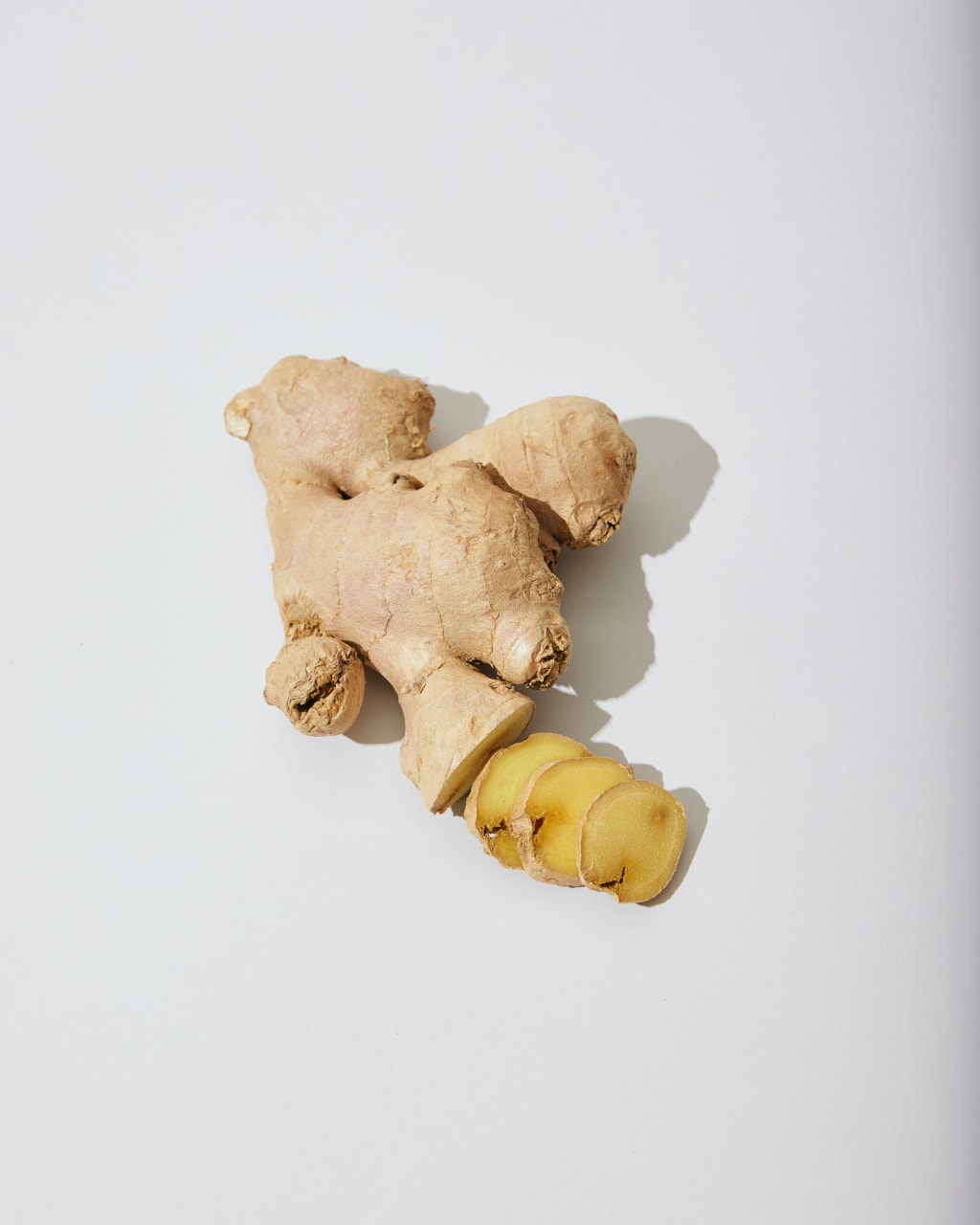
Ginger can be found in almost every home because of its taste, aroma and medicinal properties. Due to the health benefits of ginger, it is the most common flowering plant. Ginger was introduced to the Mediterranean a century ago, but three centuries later it was introduced to Japan, Great Britain, and the United States. According to the
herbalist, ginger was born in China, Southeast Asia and India. Ginger is usually used as a spice or flavoring in foods. Ginger contains various inert ingredients such as phenolic compounds and terpene compounds.
Ginger root contains three major phenolic compounds: gingerol, shogaol and parador. Gingerol is the main component of fresh gingerol such as 6-gingerol, 8-gingerol, 10-gingerol. In addition to its many health benefits, ginger also protects the body from many illnesses
The rhizome (the underground part of the stem) is commonly used as a spice. Ginger root is usually simply called ginger or ginger. It is best to plant ginger in the first half of May when the west coast of India received a pre-monsoon shower.
When planted under irrigated conditions, planting time can be extended well beyond mid-February or early March.
Various forms of ginger are commonly used in recipes such as oil powder and ginger. Fresh ginger roots are usually light yellow on the inside and light brown on the outside. The ginger base is finely textured and light brown. When exposed to light, crystalline ginger changes color from dark yellow to dark amber. Ginger tea is delicious at any time of the day, but it is recommended to drink it in the morning.
Increases metabolism in the first few minutes after waking up, interrupts an overnight fast and prevents nausea. Here are the top 10 ginger health benefits you can want to add to your diet. Our healthy body depends on a healthy stomach. Therefore, eating ginger increases agni (digestive fire) and helps with proper decomposition and assimilation of food. Ginger also stimulates the digestive enzymes bile and saliva to aid in proper digestion.
Tea is rich in healthy nutrients (Na, K, Mg, Vitamin C, Iron), so ginger is also added to improve stomach function. In addition, research shows that ginger also helps reduce excess fat in our body. However, eating ginger can help burn calories, reduce hunger, and help overweight people lose weight.
Several other health benefits are also associated, such as improving cholesterol, blood sugar, blood pressure, and inflammatory proteins.
Ginger is very effective for mental health. Ginger improves brain function. One study showed that bioactive and antioxidant compounds reduce inflammation in the brain. Ginger promotes blood flow to the brain. Ginger has antiviral and antibacterial properties. It protects the brain from harmful illnesses, fights and kills parasites. According to a 2011 study of 60 healthy middle-aged women, ginger may enhance arousal and cognitive processing. Benefits of ginger for the human body include stress relief and depression relief.
Ginger contains 14 bioactive compounds and antioxidants that can not only improve mood, but also improve mental abilities. Serotonin is also contained in small amounts in ginger. It reduces the mental and physical stress of our body by destroying harmful chemicals. According to a 2010 study, ginger was an effective pain reliever due to injury and exercise. Ginger is very effective in relieving pain and pain. When you eat ginger, your body also produces a chemical called salicylic acid. Salicylic acid helps overcome pain and discomfort by blocking the production of prostaglandins in the nerves. However, about 2 grams of ginger per day is not immediately effective in relieving pain. Warm herbs, especially ginger, relieve nerve pain and are effective in repairing. Adding ginger to your diet helps lower cholesterol levels. Ginger has a moderate lipid-lowering effect on total cholesterol and body weight in patients with hyperlipidemia. Anyone can get rid of excess cholesterol from their body by taking 5 grams of
ginger daily for 3 months. Ginger reduces the risk of heart disease by lowering LDL cholesterol levels. Be careful with your diet to lower cholesterol. Ginger contains gingerol, which suppresses inflammation and soothes inflamed skin. It is also effective for whitening with gingerol, which fights free radicals and promotes a smooth and even skin tone.
Anti-inflammatory and antibacterial properties also help brighten dark spots. Use a mask of honey, lemon juice and ginger. It becomes even softer and can even soften skin tones. Do not use if you are allergic to ginger. Ginger is safe, but long-term use can irritate the skin. In the blood vessels of the heart, ginger prevents blood clots. Ginger contains antioxidants that prevent plaque from forming in arteries. Ginger`s bloodthinning properties help prevent blood clots and lower your risk of heart attack and stroke.
In both humans and animals, Ginger reduces pressure in several ways. For example, it decreases the risk of heart attacks and fights infection to boost Immunity. Ginger may help eliminate free radicals, improve blood lipid levels, and prevent platelets from clumping together in the blood as part of its antiinflammatory effects. However, high doses can cause drowsiness and palpitations.
It may also tend to thin the blood. Do not use if you are currently taking prescription anticoagulants such as warfarin. Talk to your doctor if you have a chronic illness.
Ginger is very effective in treating diabetes. Ginger lowers blood sugar levels and helps control diabetes. In addition, ginger regulates insulin production and improves glucose uptake into muscle cells without insulin. Add ginger to your food and drink ginger tea. Ginger has too many advantages. Diabetics should consult a doctor before adding ginger to their diet. It can be added to the diet in powder form without making ginger medicine.
The effect of ginger on insulin levels is well documented. Therefore, ginger supplements may interact with certain diabetes medications. Taking ginger supplements and taking diabetes medications can lead to hypoglycemia and hypoglycemia. Ginger has antioxidant and anti-inflammatory properties and can boost immunity. Ginger is full of antioxidant compounds that help prevent stress-induced damage to our body's DNA. This helps our body fight chronic diseases such as heart disease, high blood pressure and lung disease and promote healthy aging. Ginger suppresses the growth of many bacterial fungi and fights inflammation. The study also showed that the antioxidant capacity and immune function of birds reduce the inflammatory response. This positive effect of ginger extract can improve the production capacity of laying hens. Ginger has antiviral and anti-inflammatory properties. Ginger antioxidants prevent inflammation of our body. Ginger is also a virus countermeasure and fights against microorganisms.
Zingerone and gingerol are found in ginger, which inhibits viral replication and prevents the virus from invading host cells. Ginger also has anti-inflammatory properties and is useful in treating cough caused by asthma. Ginger can relieve coughing because the anti-inflammatory compounds in ginger relax the membrane that covers the airways.
Gingerol is an ingredient that strengthens the body and instantly provides relief from the inside. Pain and swelling can be relieved by ingesting ginger or by compressing or patching the skin with ginger. Ginger contains vitamins, minerals and fatty acids that can strengthen hair and prevent hair loss. Ginger promotes blood circulation in the scalp. Ginger stimulates hair follicles, roots and hair growth. Various ingredients of ginger (magnesium, phosphorus, potassium, etc.) help hair growth and prevent hair loss. In addition, these minerals stimulate blood circulation in the scalp.
Ginger has an effective antifungal effect on dandruff and hair loss. Ginger not only increases blood flow, but also stimulates hair growth, strengthens roots and results in stronger hair follicles.
Ginger not only strengthens the hair, but is also rich in fatty acids, vitamins and minerals. Nevertheless, it may benefit certain scalp conditions due to its anti-inflammatory properties. Ginger is a natural substance, but it may have side effects. Ginger can reduce inflammation, fight illness, and reduce the molecules that cause cancer. Taking small doses daily can improve your overall health. Ginger root is rich in nutrients, so drinking it gives you additional nutrients.
Mild side effects include heartburn, diarrhea, belching, and upset stomach. However, there are many health benefits of ginger. Ginger can help us stay healthy and healthy by using it in our daily lives.
About the Creator
silviu69
Subscribe to my stories!
Show your support and receive all my stories in your feed.
Enjoyed the story? Support the Creator.
Subscribe for free to receive all their stories in your feed. You could also pledge your support or give them a one-off tip, letting them know you appreciate their work.





Comments
There are no comments for this story
Be the first to respond and start the conversation.